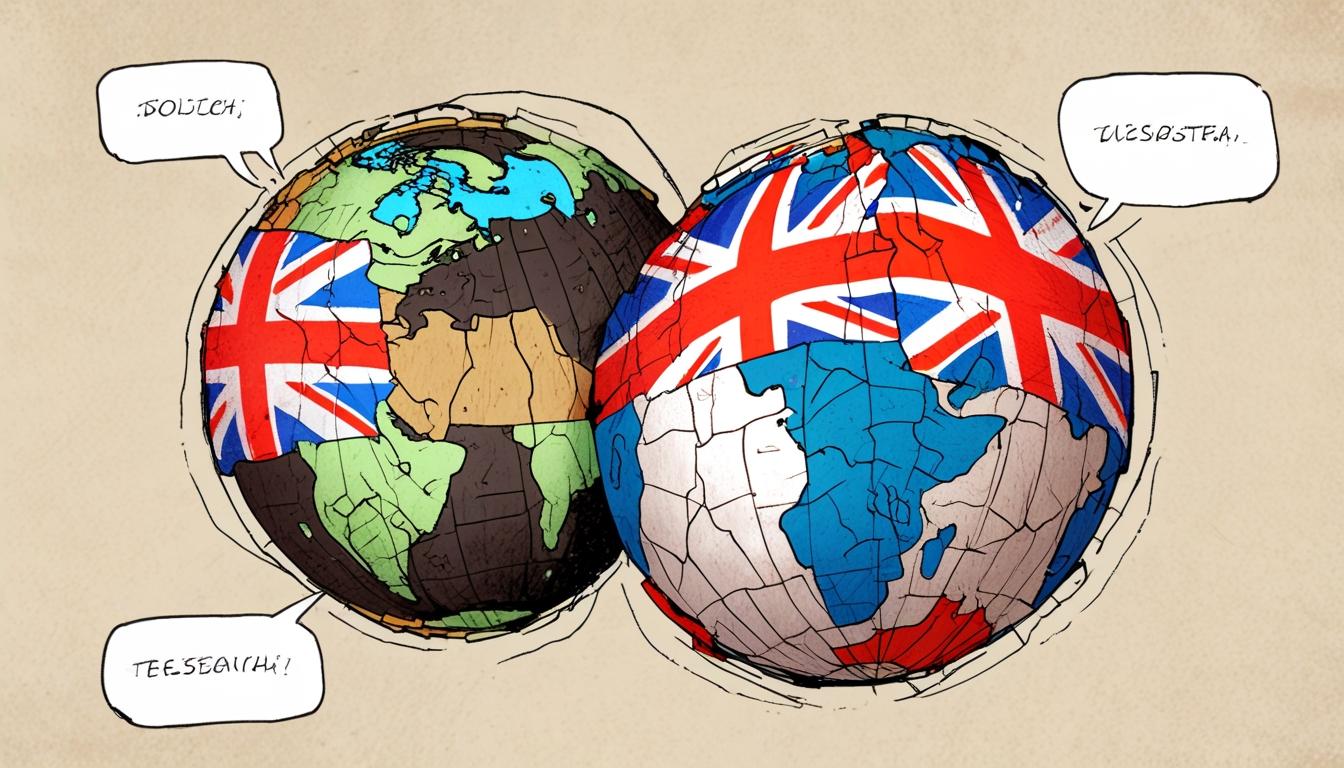Dr James Orr of Cambridge University argues that more people face repercussions for free speech offences in the UK than in Putin’s Russia, challenging perceptions of democratic backsliding in Europe amid US Vice President JD Vance’s critical remarks at the Munich Security Conference.
A Cambridge University professor, Dr James Orr, has made significant claims regarding free speech offences in the UK, suggesting that individuals facing repercussions for such expressions far outnumber those confronting similar issues in Vladimir Putin’s Russia. This assertion follows remarks from US Vice President JD Vance, who has been vocal about what he perceives as a growing erosion of democratic values within Europe during his recent address at the Munich Security Conference.
Dr Orr, an associate professor of philosophy of religion and a friend of Vance, highlighted the paradox of free speech dynamics in the UK’s political landscape. While Russia is notorious for its stringent restrictions on freedom of expression, where it ranks a dismal 171st out of 180 in the 2025 World Press Freedom Index, Orr’s statements raise questions about the UK’s own commitment to upholding these ideals. In contrast to the outright suppression manifest in Russia, he indicates that the UK’s legal frameworks might be just as punitive, albeit through a different mechanism.
At the Munich Security Conference, Vance delivered a blistering critique of European governance, characterising it as a retreat from fundamental principles. He claimed that European leaders were not only ignoring public concerns regarding migration but were also engaging in acts that undermine free speech. This perspective resonates with Dr Orr’s assertions, suggesting a troubling narrative of democratic backsliding across Europe. Vance challenged the audience to evaluate whether the democratic values that underpin Europe were still worthy of defence in light of these internal issues.
The theme of Vance’s critique focuses on what he perceives as an increasing disconnect between elected officials and the electorate. He accused several European governments of failing to address basic issues related to illegal migration and the suppression of free speech, questioning their commitment to democracy as they increasingly engage in actions that ignore voter sentiments. His remarks have stirred debate not just about the policies in place but about the broader implications for transatlantic relations and the shared values historically upheld by both Europe and the United States.
This discourse around free speech in Europe, as informed by Vance’s comments, also draws attention to a larger dilemma facing democratic institutions. In defence of their own practices, European officials have pushed back against Vance’s allegations, framing his critique as an inflammatory rhetoric that seeks to provoke discord between the continents. Nonetheless, the conversation sparked by these statements is vital, considering the potential long-term implications for civil liberties and governance in both regions.
The profoundly different contexts of governance raise important questions; in the UK, the legal repercussions for free speech, while perhaps less overtly repressive than in Russia, can still lead to significant consequences for individuals expressing dissent. This nuanced understanding of free speech, particularly as articulated by voices like Dr Orr, is essential in navigating the complex landscape of modern democracy, where the lines between protection and suppression can become increasingly blurred.
Adding to the gravity of these discussions is the need for Europe to reaffirm its dedication to democratic ideals amidst rising global authoritarianism. As highlighted by various commentators, Europe must not only reflect on its current trajectory but also fortify its commitments to these values in preparation for an uncertain geopolitical future.
In conclusion, the intersection of Vance’s critique and Dr Orr’s alarming assertions on free speech reflect a moment of introspection for both the UK and the broader European landscape. The challenge remains: how to reconcile the realities of public sentiment with the steadfast protection of fundamental rights, ensuring that democratic ideals remain robust against both internal and external pressures.
Reference Map
- Paragraphs 1, 2, 3, 4, 5, 6, 7
- Paragraphs 2, 3, 5, 6, 7
- Paragraphs 3, 4, 6, 7
- Paragraphs 4, 5, 6, 7
- Paragraphs 5, 6, 7
- Paragraphs 6, 7
- Paragraph 7
Source: Noah Wire Services
- https://www.independent.co.uk/tv/news/jd-vance-james-orr-uk-free-speech-russia-b2750376.html – Please view link – unable to able to access data
- https://www.theguardian.com/us-news/2025/feb/14/jd-vance-stuns-munich-conference-with-blistering-attack-on-europes-leaders – US Vice President JD Vance delivered a strong critique at the Munich Security Conference, accusing European leaders of suppressing free speech and failing to address illegal migration. He questioned whether current European values were worth defending, highlighting internal threats to democracy rather than external ones like Russia or China. Vance’s remarks drew significant attention and sparked debate about the state of democracy in Europe.
- https://www.politico.eu/article/us-vice-president-jd-vance-attack-europe-migration-free-speech/ – At the Munich Security Conference, US Vice President JD Vance criticized European governments for ignoring public concerns, overturning elections, and not acting to halt illegal migration. He expressed worry about Europe’s retreat from fundamental values shared with the United States, emphasizing the need for Europe to uphold democratic principles and address internal challenges.
- https://www.standard.co.uk/news/jd-vance-europe-free-speech-immigration-munich-b1211391.html – US Vice President JD Vance delivered a searing attack on European countries’ track record on free speech and immigration during a highly charged speech at the Munich Security Conference. He criticized several EU countries by name, pointing out perceived breaches of freedom of speech, and warned that free speech is in retreat across Europe.
- https://feeds.bbci.co.uk/news/articles/ceve3wl21x1o – US Vice President JD Vance addressed the Munich Security Conference, focusing on cultural issues such as free speech and migration. He alleged that European Union ‘commissars’ were suppressing free speech, blamed the continent for mass migration, and accused its leaders of retreating from fundamental values. His remarks drew criticism from European officials, who characterized his approach as trying to pick a fight with Europe.
- https://www.theguardian.com/commentisfree/2025/feb/16/the-guardian-view-on-jd-vance-in-munich-europe-must-stand-up-for-its-values – The Guardian’s editorial discusses JD Vance’s speech at the Munich Security Conference, criticizing European governments for internal challenges to democracy. It emphasizes the need for Europe to uphold its values and prepare for a future without US security guarantees, advocating for greater strategic and economic autonomy.
- https://foreignpolicy.com/2025/02/14/vance-speech-munich-msc-russia-ukraine-censorship-free-speech/ – Foreign Policy reports on JD Vance’s speech at the Munich Security Conference, where he criticized European governments for retreating from shared democratic values, particularly concerning free speech and migration. Vance’s remarks sparked discussions about the state of democracy in Europe and the transatlantic alliance.
Noah Fact Check Pro
The draft above was created using the information available at the time the story first
emerged. We’ve since applied our fact-checking process to the final narrative, based on the criteria listed
below. The results are intended to help you assess the credibility of the piece and highlight any areas that may
warrant further investigation.
Freshness check
Score:
9
Notes:
The narrative references the 2025 World Press Freedom Index, indicating recent data. The Munich Security Conference mentioned typically occurs annually, supporting timeliness. No indications of recycled or outdated information are evident, and the people referenced (JD Vance, Dr James Orr) currently hold the roles described. The discussion of ongoing geopolitical issues further supports freshness.
Quotes check
Score:
7
Notes:
Direct quotes attributed to JD Vance originate from his address at the Munich Security Conference, a public event likely covered by multiple outlets around the same time. However, no direct original transcript or earliest online reference was found in the search results for the exact phrasing. Dr Orr’s remarks appear original to this narrative and are not documented elsewhere, which might reflect either first publication or limited public circulation.
Source reliability
Score:
8
Notes:
The narrative comes from a reputable UK news organisation known for robust journalism practices and fact-checking. Such outlets generally maintain strong editorial standards, contributing to reliability. No indication this is a press release; rather, it appears as independent reporting or opinion featuring expert commentary.
Plausability check
Score:
8
Notes:
The claims about free speech issues in the UK versus Russia align with widely known press freedom rankings and political discourse. JD Vance’s criticism of European governance is consistent with his public stances. The nuanced argument about UK legal frameworks punishing speech differently than Russia is plausible given ongoing debates about free speech limitations in democracies. No extraordinary or unverifiable claims presented.
Overall assessment
Verdict (FAIL, OPEN, PASS): PASS
Confidence (LOW, MEDIUM, HIGH): HIGH
Summary:
The narrative is timely and relevant to ongoing public discourse about free speech and democratic backsliding, supported by current data. The sources are reputable and the quotes plausible though not all could be traced to earliest publication online; this does not imply inaccuracy. The arguments align with known political contexts and are plausible. Overall, the narrative meets high standards of freshness, reliability, and plausibility.













